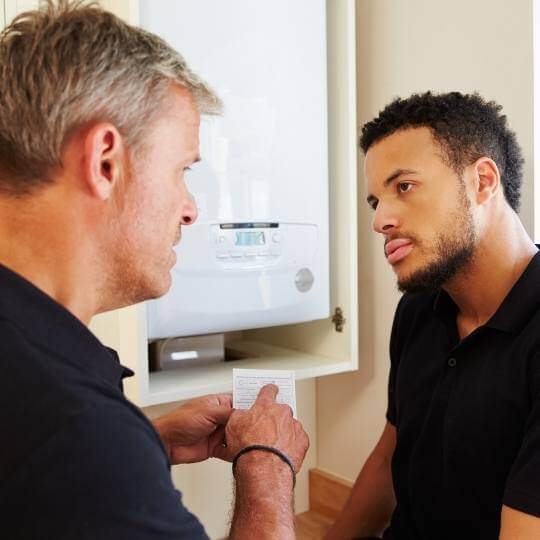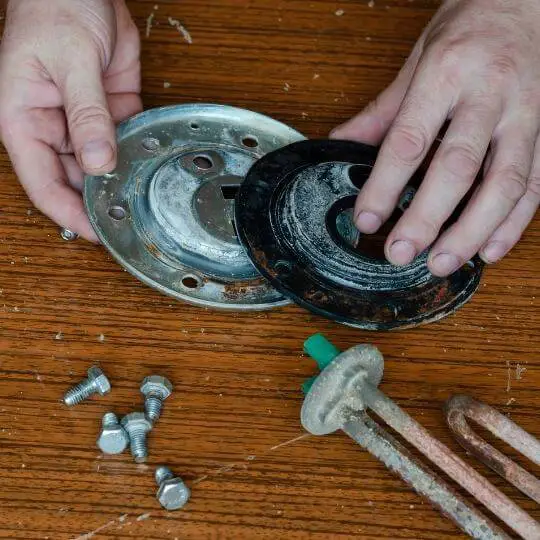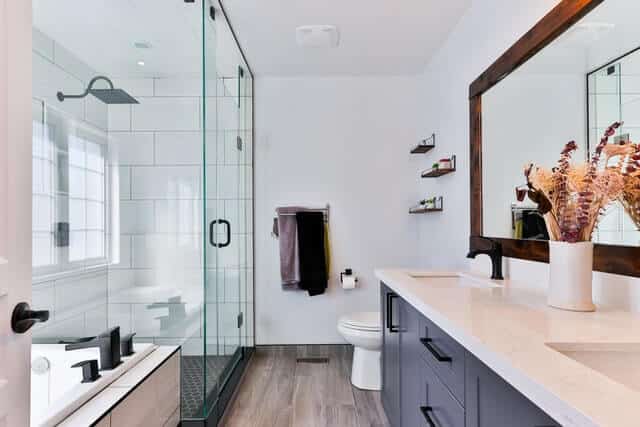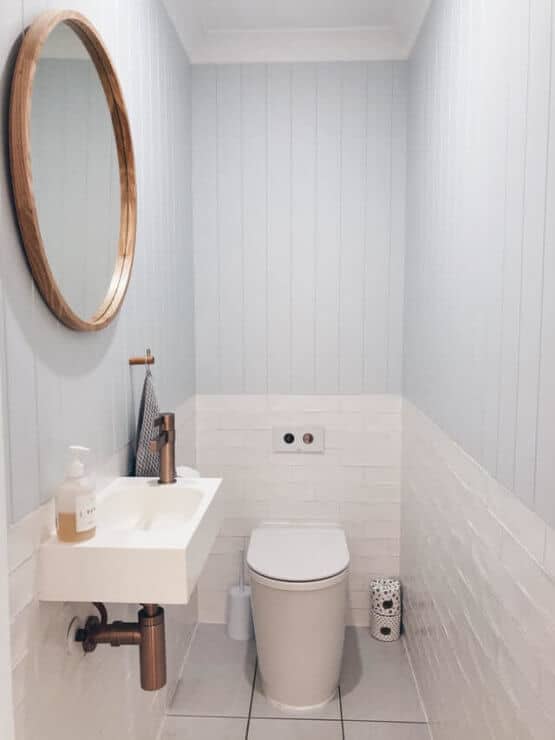Natural gas, steam, electricity, oil, or hot water boilers provide the heat necessary for keeping the house warm during the winter season. Therefore, if your boiler breaks down and ceases to function, you may ask yourself, do plumbers fix boilers?
Finding the right person to repair is always important.
So Do Plumbers Fix Boilers?

No, plumbers do not fix boilers by default. Plumbers can only install and repair boilers if they have trained for it and have the Gas Safe qualification.
The government requires that every expert working on boilers be licensed. [1]
Most people assume that since boilers have pipes, tubes, and fittings, they can be repaired by plumbers. This is not the case, however.
Most boilers use natural gas as their primary source of power. Therefore, an expert engaged to install, operate and repair them needs the appropriate Gas Safe qualification.
Modern-day plumbers, however, do not deal with lead in their plumbing. In fact, plumbers use most of their time pulling out lead pipes from commercial, residential, and industrial properties.
Read Also: Will A Gas Water Heater Work Without Electricity
Plumbers who have Gas Safe qualifications and can fix boilers are pretty common. After all, there is no law prohibiting plumbers from training in and obtaining a license to operate and install boilers.
But in most cases, these are few and far between. Most plumbers specialize in handling piping systems and their associated fittings.
Additionally, working as a plumber does not require any formal qualification.
As long as one has the skills to get the job done, one can offer services to customers. A plumber who repairs boilers without the Gas Safe license will be breaking the law and can be prosecuted.
Who Fixes Boilers?

A heating engineer is the person to call when you need a boiler system installed. They repair central heating systems that break down as well as carry out general heating system maintenance.
Heating engineers are trained to deal with all systems that handle heat, such as boilers, radiators, and the associated pipes and fittings.
The heating engineer’s primary role is to work on the heating system of a structure. [2]
Their main job description includes installing and maintaining the boilers, radiators, pipework, fittings, and fixtures required to get the building heated.
Heating engineers usually work in industrial, commercial, and residential buildings to create and adopt solutions to heating needs.
In most cases, heating engineers do not branch out into any other type of work. They remain solely in the heating department. So, if you have a problem with your boiler or central heating system, you should call the heating engineer.
They are the most qualified person and will offer you the best service.
Plumber Rules
The confusion regarding a plumber’s job stems from the fact that the plumbing trade covers a variety of tasks. A plumber has a job description that entails working with the kitchen’s and bathroom’s dry and wet pipes.
Some of them install, service, and maintain boilers and heating systems if they are Gas Safe registered.
Many plumbers are skilled in the art of handling heating systems and usually install and service them regularly. For such plumbers, operating a boiler system is a walk in the park because they have the skills for it.
However, before you call such a plumber to fix your boiler, you should confirm that they are Gas Safe Registered.
Examples of tasks that a plumber is suitable for include:
- Repairing leaks in piping systems and fittings.
- Installation of plumbing appliances such as dishwashers and washing machines.
- Installation, repair, and replacement of pipes and fittings.
- Shower and bathroom appliance installation and repair.
- Installation, removal, or replacement of radiators.
- Unblocking toilets, drains, and sinks.
- Installation, maintenance, and repair of boilers (for those with Gas Safe qualification).
- Installation, maintenance, and repair of heating systems.
When should you Repair your Boiler?
Numerous tell-tale signs will indicate that your boiler needs servicing or repair. The important thing is to keep checking the boiler system to identify minor problems. Once identified, the issues should be addressed before they accumulate and cause a disaster.
Cases of neglected boilers leaking gases, blowing up, and causing extensive damage to property and loss of life are common. When you detect the problems outlined below, you should call in the heating engineer to fix your boiler:
- Leakage of water from the boiler.
- Banging or clanking sounds.
- The boiler turns itself off unexpectedly.
- Loss of pressure in the boiler and associated pipework.
- There are unusual smells in the boiler room.
- The pilot light changes to yellow instead of blue.
- Fluctuating temperatures.
Read Also: Hydronic Boiler Maintenance
Difference between Plumber and Heating Engineer
Some of the tasks carried out by a plumber and a heating engineer may overlap. However, these are two separate professions with separate sets of skills and requirements. It is critical that you know which professional to call for the right job when you need their services.
This will ensure that the task is not only performed to the highest standards but also guarantee safety for your home. When you need work done on the boiler system and home heating system, always hire a Gas Safe registered heating engineer to solve your problem.
The engineer has the skills for repairing, servicing, and restoring the system to optimal operation. However, when you need work done on water supply systems, bathroom, and kitchen appliances, a plumber is the right person to call.
Plumbers have skills for the installation and repair of pipes and fittings.
A plumber works on water appliances, including sinks, pipes and fittings, and toilets. Heating engineers, on the other hand, handle heating systems such as boilers, hot water cylinders, radiators, and thermostats. Other differences between plumbers and heating engineers are:
- Plumbers have skills in a wide range of tasks as their roles are more general. The specific nature of a heating engineer’s job means that their abilities are also detailed.
- Heating engineers require Gas Safe certification to operate. Failure to obtain the license will render their activity illegal. Plumbers, on the other hand, require no professional accreditation to carry out their tasks. They just need the skills for the job to keep them going.
- A plumber works on a wide variety of jobs, including working with dry and wet pipes and fittings. Some plumbers with Gas Safe certification can also work on home heating systems. A heating engineer’s job is restricted to working with heating systems, and they may not perform any task outside this field.
When do You Need a Plumber?
Knowing when to call in the plumber is crucial to ensuring that your home plumbing system operates optimally. Some simple plumbing tasks like replacing a lost nut or bolt can be safely carried out by you as the homeowner, provided you have the right tools.
However, other jobs are more complex and require the services of a qualified plumber.
So, when do you need the services of a plumber? The scenarios outlined below are just a few examples of the tasks that a plumber can work on.
- When your drainage system is blocked.
- In case of leaking pipes and fittings.
- When your taps and pipes are constantly dripping.
- When the flushing unit on the toilet is not working correctly.
- In case your water supply flow rate is restricted.
- Blockage of toilet and bathroom systems.
- When your pipes have frozen over.
- Flooding of the house due to failure of the water supply system.
- Faulty dishwashers, washing machines, and other kitchen and bathroom appliances.
- When you need to install a new kitchen or bathroom appliance installed.
- When you need new pipes and fittings installed.
- When the water supply is interrupted, and the problem is not from the source.
- Installation and maintenance of sewage and irrigation systems.
When Should You Call a Heating Engineer?
Failure of the boiler and heating system can spell disaster for your home if the problem is not fixed on time. Unfortunately, you cannot carry out boiler system repair on your own unless you are a heating engineer.
You will need to hire a qualified heating engineer who is Gas Safe registered.
So, when should you call the heating engineer? Below are outlined some scenarios that might require the services of such an engineer.
- There is leakage of water from the boiler.
- The boiler turns itself off unexpectedly.
- There are banging or clanking sounds originating from the boiler.
- The pilot light changes to yellow instead of blue.
- Loss of pressure in the boiler and associated pipework.
- There are unusual smells in the boiler room.
- The temperature in the house is not stable and keeps changing.
Check that the Heating Engineer is registered.
Plumbing and heating systems are different, and each demands its own sets of skills. Although it is possible to be skilled in both, most tradespeople tend to specialize in one field.
A highly specialized heating engineer has the skills necessary for repairing boilers. Consequently, they may decide that they will not engage in any other heating system tasks.
A skilled plumber who specializes in heating appliances can carry out tasks involving installation, repair, and maintenance of radiators. Similarly, they may choose to forego boiler repair.
Boiler repair work involves dealing with gas, which is why only Gas Safe licensed heating engineers are allowed to handle such tasks. This is what sets plumbers apart from heating engineers.
The plumber does not require Gas Safe licensing to carry out their functions. It is essential to ensure the professional you engage in repairing your boiler is registered.
This is important because the gas industry has strict regulations regarding the handling of gas. [4]
Fortunately, checking to verify that a heating engineer is registered is simpler these days than it was in the past. Most authorities maintain an online list of Gas Safe registered professionals and companies for the public to access.
You only need to visit the site to find the details of the individual or company’s registration.
Do Plumbers Fix Boilers – Final Word
The confusion in the industry about the role of plumbers and heating engineers can be cleared with simple research. Hopefully, this article provides much-needed clarification and helps you identify the differences between plumbers and heating engineers.
This distinction is important because it facilitates you in getting the right professional for the job. A heating engineer can repair a faulty boiler.
And so can a plumber, if they have the skills for the job and are Gas Safe registered. Otherwise, the plumber’s job description is limited to dealing with dry and wet pipework.
So, when your boiler decides to fail you in the future, you know whom to call and their role in getting the system back to work again.

Michael Davis is a heating & plumbing expert who currently works as independent contractor in SC. He also writes for Plumbertip.
For almost 10 years he worked on various plumbing tasks across South Carolina.


